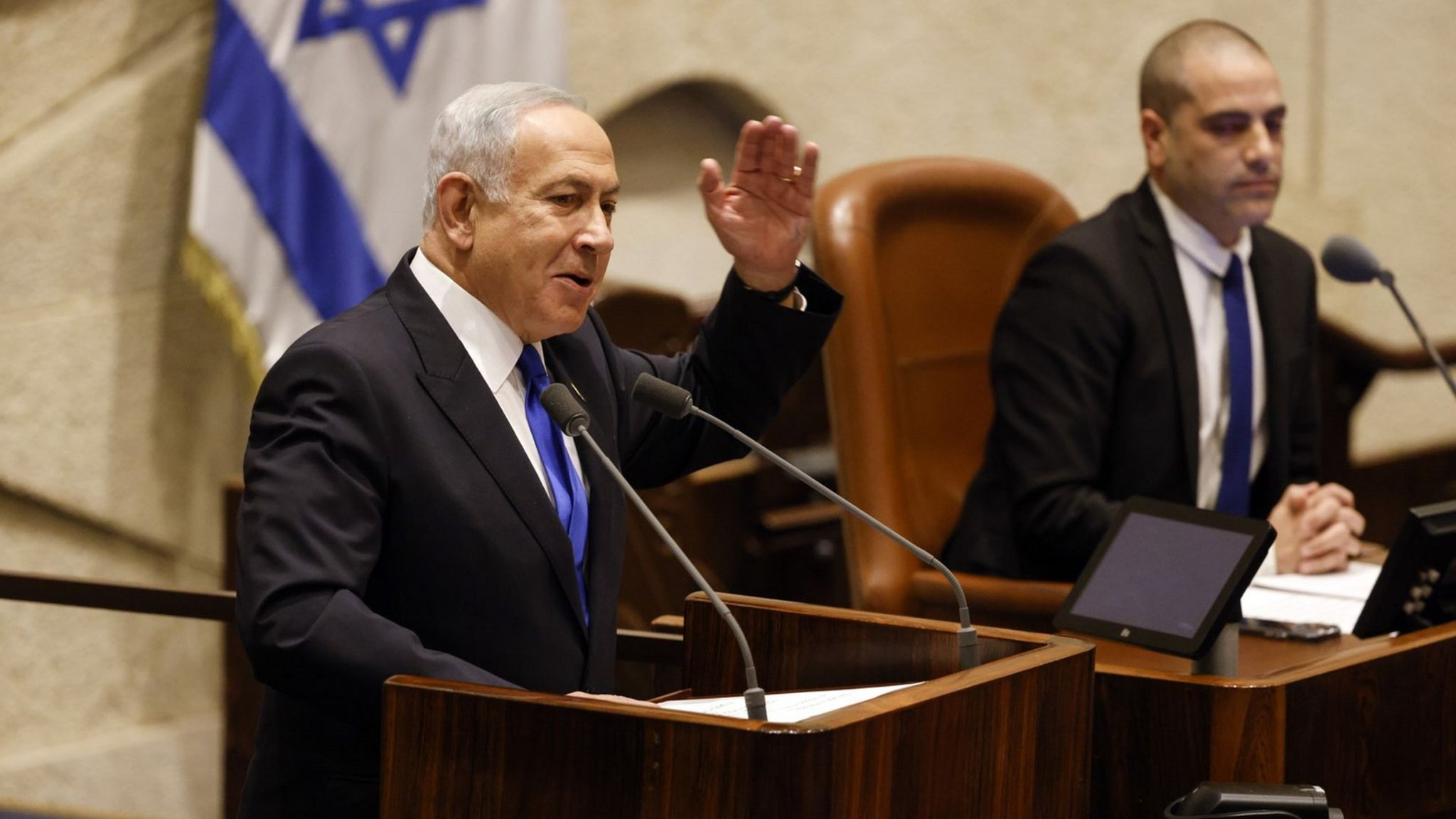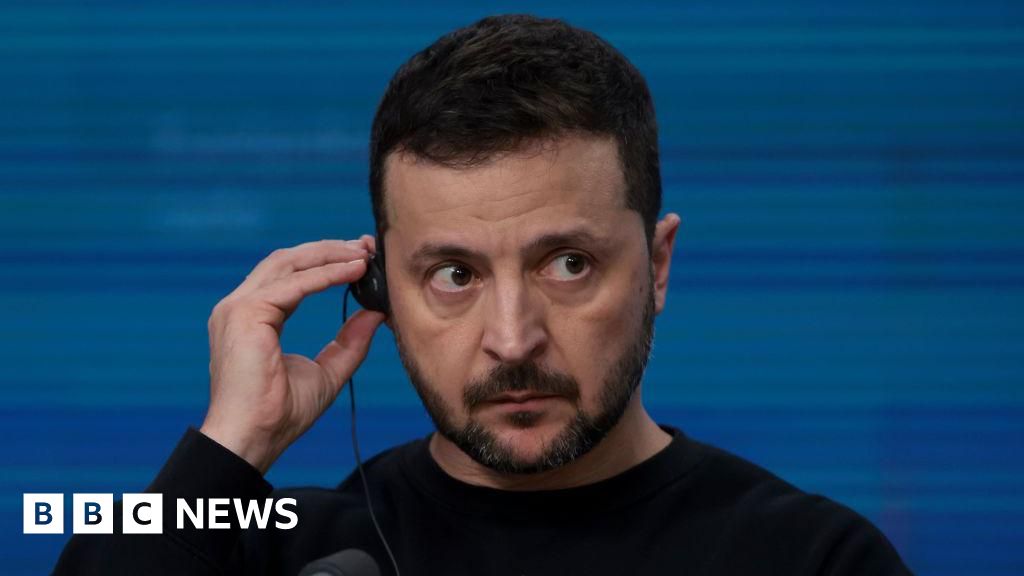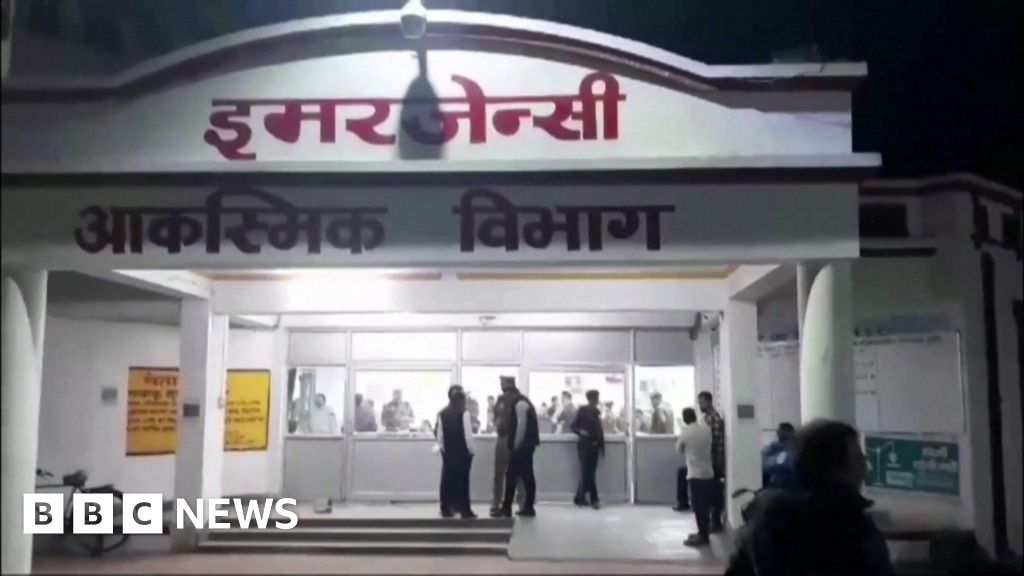ARTICLE AD BOX
 Image source, EPA
Image source, EPA
Benjamin Netanyahu said his administration would "restore governance, peace and personal security"
By Yolande Knell & David Gritten
BBC News, Jerusalem & London
The most religious and hard-line government in Israel's history is due to be sworn in.
Benjamin Netanyahu will return as prime minister, after his Likud party formed a coalition with ultranationalist and ultra-Orthodox Jewish allies.
There is domestic and international concern it will inflame the conflict with the Palestinians, damage the judiciary and restrict minority rights.
Mr Netanyahu has promised to pursue peace and safeguard civil rights.
Addressing a special session of the Knesset (parliament) in Jerusalem on Thursday, he stated that his administration would "restore governance, peace and personal security to the citizens of Israel".
"I hear the opposition's constant laments about 'the end of the state', 'the end of democracy', members of the opposition, losing the elections is not the end of democracy - this is the essence of democracy."
Several hundred protesters gathered outside, waving Israeli flags, rainbow flags bearing the Star of David, and signs reading "shame", "danger" and "down with racism".
Mor, a woman from Jerusalem, told the BBC: "I'm here because my country's falling apart from its democratic values. I'm getting hurt as a woman and my friends are getting hurt as women, LGBTQ [people], Arabs."
Hundreds of protesters gathered in front of the Knesset ahead of the swearing-in ceremony
This will be a record sixth term as prime minister for Mr Netanyahu, who was ousted by his opponents 18 months ago, but his coalition partners are pledging to lead the country in a new direction.
They have promised to give parliament powers to overrule the Supreme Court, made anti-LGBTQ statements, and called for businesses to be allowed to refuse services to people based on religious grounds.
The first guiding principle of the new government, published on Wednesday, declares that "the Jewish people have an exclusive and unquestionable right to all areas of the land of Israel". It says that includes the occupied West Bank and promises to "advance and develop" settlements there.
About 600,000 Jews live in about 140 settlements built since Israel's occupation of the West Bank and East Jerusalem in 1967. Most of the international community considers the settlements illegal under international law, though Israel disputes this.
There are also some 100 outposts - small settlements built without the Israeli government's authorisation - across the West Bank.
In a coalition deal with the ultranationalist Religious Zionism party he signed last week, Mr Netanyahu agreed to retroactively legalise the outposts. He also promised to annex the West Bank while "choosing the timing and weighing all of the State of Israel's national and international interests". Such a step would be opposed by Israel's Western and Arab allies.
Image source, EPA
Image caption,Far-right politicians Itamar Ben-Gvir (L) Bezalel Smotrich (R) will hold key positions in the new government
Religious Zionism leader Bezalel Smotrich, a West Bank settler, will be finance minister and also oversee the Civil Administration, which approves settlement building in the West Bank and controls important aspects of Palestinians' lives.
Otzma Yehudit (Jewish Power) party leader Itamar Ben-Gvir, another settler and ultranationalist politician who has previously been convicted of racism and supporting a terrorist organisation, will be national security minister, responsible for the police.
A spokesman for Palestinian President Mahmoud Abbas warned on Thursday that the plans to develop West Bank settlements "constitute a dangerous escalation and will have repercussions for the region".
Mr Netanyahu's coalition partners reject the idea of a two-state solution to the Israel-Palestinian conflict - the internationally backed formula for peace which envisages an independent Palestinian state in the West Bank alongside Israel, with Jerusalem as their shared capital.
There have also been expressions of concern both inside and outside Israel about the very rigid views on the application of Jewish law and LGBTQ rights held by incoming ministers in the new government.
Avi Maoz, head of the anti-LGBTQ Noam party, will serve as a deputy minister in the prime minister's office. He has called for Jerusalem's Gay Pride event to be banned, disapproves of equal opportunities for women in the military, and wants to limit immigration to Israel to Jews according to a strict interpretation of Jewish law.
Activists, doctors and business leaders have meanwhile warned that discrimination against LGBTQ individuals could potentially be legalised if the anti-discrimination law is changed to allow private businesses to refuse to provide a service if doing so would violate the provider's religious beliefs.
Although the coalition deal between Likud and the ultra-Orthodox United Torah Judaism party calls for such an amendment, Mr Netanyahu has said he will block it and that his government will not allow any harm to the LGBTQ community. He has also chosen an openly gay member of Likud, Amir Ohana, to be parliamentary speaker.
Critics have also expressed concern at the new government's declared intention to alter the checks and balances of power, giving a parliamentary majority the ability to override Supreme Court rulings.
Mr Netanyahu's coalition partners have also proposed legal reforms that could end his ongoing trial on charges of bribery, fraud and breach of trust. He denies any wrongdoing.
Daniel Johnas said he was concerned about future of life in Israel for himself, his husband and children
At Thursday's protest outside the Knesset, a woman from Tel Aviv, who did not want to give her name, said: "I refuse to accept what I feel is the possibility of the beginning of a fascist regime and I want to protect the rights of every citizen living in this country."
"The problem is that the prime minister is so anxious to stay in power that he will give anything to anyone," she added.
Daniel Johnas, an activist in the religious LGBTQ community, told the BBC that he was worried for the first time to go on the street with the rainbow flag. He also said he was concerned about future of life in Israel for himself, his husband and children.
In an op-ed published in the Wall Street Journal on Monday, Mr Smotrich defended his party and its coalition partners.
"They say I am a right-wing extremist and that our bloc will usher in a 'halachic state' in which Jewish law governs," he wrote. "In reality, we seek to strengthen every citizen's freedoms and the country's democratic institutions, bringing Israel more closely in line with the liberal American model."

 1 year ago
17
1 year ago
17








 English (US)
English (US)